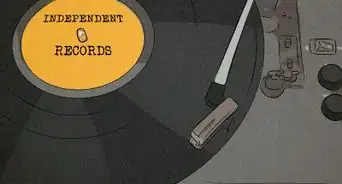This article was co-authored by Timothy Linetsky. Timothy Linetsky is a DJ, producer, and music educator that has been making music for over 15 years. He is a certified Ableton trainer and creates educational YouTube videos focused on producing electronic music. He has over 90,000 YouTube subscribers.
There are 8 references cited in this article, which can be found at the bottom of the page.
This article has been viewed 78,165 times.
The music business is incredibly competitive, and just finding work can be a struggle. Finding the right manager can help you navigate the business, letting you focus on your craft as you let someone else handle the business aspects. You can go looking for an agent yourself, or you can make sure the right agent finds you.
Steps
Finding a Manager Yourself
-
1Make sure you have something to manage. Before you start looking for a manager, you have to make sure your career is worth managing. Take an honest look at what you’ve accomplished so far and what you’re looking to accomplish.[1] If your music career brings in $1000 or less monthly, it might not be the right time to look for a manager.[2]
- If your career isn’t needing a manager yet, start by managing your own career. Managers typically network for you, negotiate deals and help you hire the right partners.[3] Try your hand at these different tasks, and you’ll know what you really need a manager for.
- Managers aren’t the only ones who can help you expand your career. You can look into partnering up with publicists, writers, and designers.
-
2Have something to submit to potential managers. If you’re going to try contacting a manager, you need to be able to show them your musical ability. Ideally, you need quality recordings of your music, especially your best songs. While recording studio sessions can be expensive, the resulting recordings are crucial for your career’s future.
- In addition to studio recordings, you should have footage of any live gigs you’ve performed. This will give a potential manager a better idea of your presence on stage, as well as showing them what type of performer you are.
- If you currently have a record deal, working on your record will give you what you need to show a manager.
Advertisement -
3Look for trustworthy people with the right skills in your circle. Before you start looking for managers and agencies, start by reaching out to friends and family. You might be lucky and know someone who has the right skills and believes in you enough to work for free (at least for a while). Make sure this person can be straight with you; if they can’t be completely honest with you, they won’t be able to manage you properly. When you think “right skills”, think of the following:
- They must be trustworthy. You need to make sure you choose someone who isn’t just going to use you as a ticket to fame and fortune. Before you decide to hire them, have interactions with them to determine if they’re trustworthy.
- Choose someone personable. This is especially important if you lack skill in this area. Your chosen manager must have the people skills necessary to talk you up and get you the right gigs.
- They have to be responsible. Avoid people who tend to deflect blame. If there are any hiccups in your career, you need someone who’s willing to take responsibility and do their best to help you past them.
- Choose a business-minded person. Your musical career needs to be run like a business. The manager you choose needs business skills to help you navigate this side of the industry.[4]
- Depending on the person you choose, and how your career develops, this may be a temporary setup. If you consider this partnership temporary, make sure the person you choose understands this.
-
4Find someone with the right skills to represent you. If you don’t have someone in your social circle who can manage your career, expand your search. One of the best ways to do this is to be constantly networking. When you play a gig, build relationships with other musicians and venue owners. If they know you’re looking for a manager, they might point you to someone they trust.[5]
-
5Cold call managers and agencies. If you don’t yet have the right connections, the best thing to do is to contact as many managers as you can. Do your research beforehand, making sure you only contact managers that are qualified and have a good reputation. Send emails, make phone calls and reach out over social media. Don’t be desperate to get representation; get the right representation.
- The internet is the best place to find people to call. Using Google will help you find agencies and managers in your area, as well as their contact information.
- The best way to cold call is to be honest about why you’re calling. Say that you’re a musician who’s looking representation. Be honest about what your career is like at the moment, don’t try to make your career sound bigger than it is or brag.
- Your cold calling strategy could take a few different forms. You can use the phone to gauge interest, speaking to managers before sending your music. Otherwise, you can use email and social media to send samples of your music, so managers can see what you’re about.
Letting the Right Manager Find You
-
1Focus on honing your craft. If you choose to not chase a potential manager, focus that energy on your music. The mindset with this method is to work on your career until the right person notices. Make sure you have quality music and great performances under your belt when they do. Write songs, find gigs and record your music.[6]
- Realize who you are as a band/solo artist. A manager does not have the time to try to figure out who you are as a musician. The less work they have to do, the better. Figure out what music you like to play and what music suits you the best. Figure out what makes you different from all the other artists in the world who play the same music as you.
- Create a set list of around 7-14 good songs. You want to have at least 1 hour of material just incase a gig comes up that requires you to play for an hour. Make sure you throw in some of your original songs. Decide what songs go where in order to enhance the viewers experience.
- Play at least 7-9 gigs at places with big audiences. Busking on the street doesn't count. You can play at local bars if you are of age or try to play at places where your genre of music is respected. Playing 7-9 shows will look good for your resume and will gain you exposure.
-
2Develop your image. If you want to be noticed by a manager, you need to stand out. Don’t go out of your way to develop a gimmick or a wacky personality. Find something in your music or your personality that’s unique to you and develop this quality. Some musicians have strong vocals, others are multi-talented and some rely on good looks.[7]
-
3Maintain a strong social media presence. Social media plays a crucial role in the business world today. A variety of platforms allow for tailored messages that can reach wider audiences than simple word of mouth. Learn the difference between each platform and use them to their fullest. Don’t forget to engage with the fans you already have and let them know you care about their support.
- Instagram is primarily visual. You have both pictures and video at your disposal. The main strength of Instagram is hashtags, which allow your posts to reach people who might be interested in your band even if they don’t follow you. For instance, using the hashtag “#metal” for a metal band can capture the attention of metal fans.
- Snapchat is the place to deliver quick, personal content. Content on Snapchat is less polished, so feel free to capture behind the scenes moments, whether you’re recording or just hanging out with your band.
- Facebook and Twitter are incredibly versatile platforms, and should be the base of your social media presence. You can create event pages to publicize your gigs, use live video to reach more fans and create photo albums detailing your day to day.[8]
- Engaging with fans is essentially about caring. Reply to comments they post on your social media platforms and show your appreciation for them through your posts.
-
4Upload music to online streaming services. While not all streaming services are equally advantageous in terms of revenue, they can give your music the necessary exposure to advance your career. These services usually take a cut on an income you receive to account for the costs of distribution.[9] Most importantly, these services give your music a place to live if your fans want to hear you outside a gig.
-
5Keep playing gigs. The gig is a musician’s lifeblood. It provides income, exposure and networking opportunities. You have to carefully choose your gigs; some provide less revenue but important exposure. You also don’t want to always work for exposure, especially if you spend the majority of your time on your music career. The more gigs you play, the more experience you get and the more visible you are.
- Prioritize gigs that foster networking. That might mean other bands or members of the media are present. The focus of the event should be the music; for example, if you play at a fundraiser, everyone’s attention is on the cause rather than your music.[10]
- If you already have a record deal, focus on fulfilling the obligations that go along with this. This will be your best bet to getting enough exposure to bring a manager to you.
Community Q&A
-
QuestionHow can I empower my fanbase so that people can be interested in the process of my music?
 Cherry Vibes MusicCommunity AnswerGo on reverbnation.com, a free way to promote your music. Set yourself up a page and you can hook you up with all the popular media sites you are on and the friends and fans you have there.
Cherry Vibes MusicCommunity AnswerGo on reverbnation.com, a free way to promote your music. Set yourself up a page and you can hook you up with all the popular media sites you are on and the friends and fans you have there. -
QuestionMy band is called 101 spirits. We aren't famous yet but we have potential. We are all 13 years old but no manager will take us cause we are too young, what should we do?
 Bella JohnstonCommunity AnswerMusic is a difficult business to get into but don't lose hope. All famous people had to come from somewhere, right? My advice would be to continue working with your band. Continue to reach out to managers. Somewhere out there, there has to be a person willing to hire your band. You could possibly ask your parents or an adult for some help with advertisement. You could start a YouTube channel, and post some songs on there. Try to reach out as much as possible in the public without a manager. After a while this should pay off, and hopefully a manager will realize how talented you guys are, and take your band.
Bella JohnstonCommunity AnswerMusic is a difficult business to get into but don't lose hope. All famous people had to come from somewhere, right? My advice would be to continue working with your band. Continue to reach out to managers. Somewhere out there, there has to be a person willing to hire your band. You could possibly ask your parents or an adult for some help with advertisement. You could start a YouTube channel, and post some songs on there. Try to reach out as much as possible in the public without a manager. After a while this should pay off, and hopefully a manager will realize how talented you guys are, and take your band. -
QuestionI am a manger and I have 3 artists but I need an idea on how to make someone our sponsor and make them believe about the incomes?
 Community AnswerShow some of your artist's best works and tell them about your plans and ambitions as a team. Also explain to them why and how their sponsorship would make a massive difference to your work. Have a business plan to both email and show them, with good details, sensible projections and examples of achievements already made.
Community AnswerShow some of your artist's best works and tell them about your plans and ambitions as a team. Also explain to them why and how their sponsorship would make a massive difference to your work. Have a business plan to both email and show them, with good details, sensible projections and examples of achievements already made.
References
- ↑ Timothy Linetsky. Music Producer & Instructor. Expert Interview. 13 February 2019.
- ↑ https://bandzoogle.com/blog/musicians-you-don-t-find-a-manager-a-manager-finds-you
- ↑ http://www.digitalmusicnews.com/2014/08/28/now-know-everything-music-managers/
- ↑ http://musicconsultant.com/music-business/find-a-music-manager-3/#.WKzrBvkrK70
- ↑ Timothy Linetsky. Music Producer & Instructor. Expert Interview. 13 February 2019.
- ↑ Timothy Linetsky. Music Producer & Instructor. Expert Interview. 13 February 2019.
- ↑ http://musicconsultant.com/music-business-plan/ciancio-burgers-rock/#.WKzrF_krK70
- ↑ http://blog.sonicbids.com/the-top-8-social-media-outlets-to-promote-your-music-and-how-to-best-use-them
- ↑ https://artists.spotify.com/guide#get-your-music-on-spotify
About This Article
The music business can be very competitive, but finding the right manager can help you focus on your music while they deal with the business side of things. Before contacting a manager, make sure you have something to show them, like quality recordings of your music or footage from live shows. You can also let a manager find you by playing a lot of gigs. Try to focus on gigs that will help you network with other musicians or where there will be a strong media presence. Most importantly, find opportunities where the music is the center of attention. Another way to attract a manager is by uploading your music online or having an active social media presence, where fans and managers can easily find out more about you and your music. To learn how to cold call agencies, keep reading!







































































